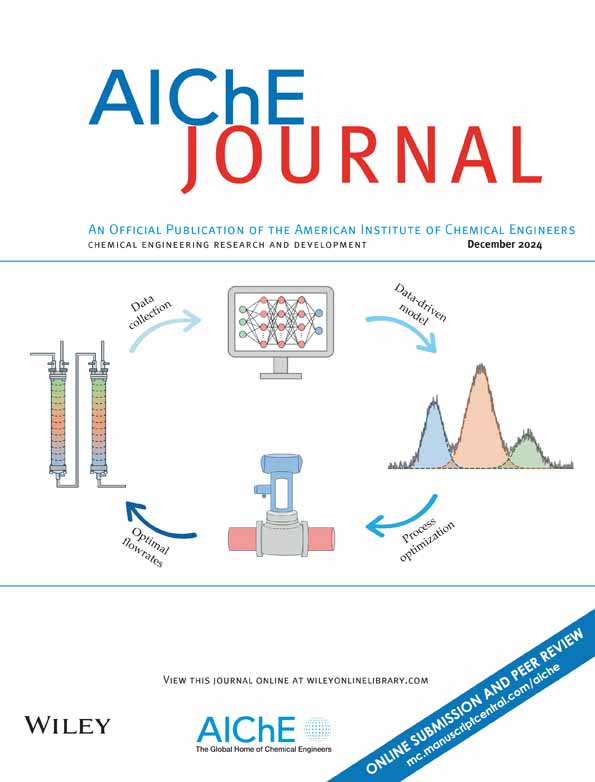优化金属有机框架内的超分子相互作用,实现超高纯度丙烯纯化
IF 3.5
3区 工程技术
Q2 ENGINEERING, CHEMICAL
引用次数: 0
摘要
利用高能效吸附分离方法提纯超高纯度丙烯(99.995%)是一项前景广阔但极具挑战性的技术,目前仍未实现。我们没有单纯考虑吸附剂对客体分子的影响,而是提出了一种协同吸附机制,利用 "主-客体 "和 "客-客体 "系统中的超分子相互作用,深度去除丙烷和丙炔。通过调节孔隙环境,Ni-DMOF-DM 对丙烷和丙炔的吸附容量极高(常温常压下分别为 171 和 197 cm3/g),丙烷/丙烯分离选择性也达到了前所未有的水平(2.74)。理论计算证实,C-H--π键和C-H--O氢键的几何相互作用是由主客体相互作用以及密闭孔隙内的C-H--H主客体相互作用产生的。突破性实验证明,在 Ni-DMOF-DM 上可直接从三元混合物中收集超高纯度丙烯(丙烷含量为 0.005%,丙炔含量为 1.0 ppm),生产率高达 152.14 升/千克。本文章由计算机程序翻译,如有差异,请以英文原文为准。
Optimizing supramolecular interactions within metal–organic frameworks for ultra‐high purity propylene purification
Purifying ultra‐high purity propylene (>99.995%) with an energy‐efficient adsorptive separation method is a promising yet challenging technology that remains unfulfilled. Instead of solely considering the effect of adsorbents on guest molecules, we propose a synergistic adsorption mechanism for the deep removal of propane and propyne, utilizing supramolecular interactions in both “host‐guest” and “guest‐guest” systems. Through modulation of the pore environment, Ni‐DMOF‐DM exhibits exceptionally high adsorption capacities for propane and propyne (171 and 197 cm3 /g at ambient temperature and pressure, respectively), and unprecedented propane/propylene separation selectivity (2.74). Theoretical calculations confirm the geometric interactions of C‐H···π bonds and C‐H···O hydrogen bonds resulting from host‐guest interactions, alongside C‐H···H guest‐guest interactions within the confined pore space. Breakthrough experiments demonstrated that ultra‐high purity propylene (propane < 0.005% and propyne < 1.0 ppm) can be directly collected from ternary mixtures on Ni‐DMOF‐DM, achieving a productivity of up to 152.14 L/kg.
求助全文
通过发布文献求助,成功后即可免费获取论文全文。
去求助
来源期刊

AIChE Journal
工程技术-工程:化工
CiteScore
7.10
自引率
10.80%
发文量
411
审稿时长
3.6 months
期刊介绍:
The AIChE Journal is the premier research monthly in chemical engineering and related fields. This peer-reviewed and broad-based journal reports on the most important and latest technological advances in core areas of chemical engineering as well as in other relevant engineering disciplines. To keep abreast with the progressive outlook of the profession, the Journal has been expanding the scope of its editorial contents to include such fast developing areas as biotechnology, electrochemical engineering, and environmental engineering.
The AIChE Journal is indeed the global communications vehicle for the world-renowned researchers to exchange top-notch research findings with one another. Subscribing to the AIChE Journal is like having immediate access to nine topical journals in the field.
Articles are categorized according to the following topical areas:
Biomolecular Engineering, Bioengineering, Biochemicals, Biofuels, and Food
Inorganic Materials: Synthesis and Processing
Particle Technology and Fluidization
Process Systems Engineering
Reaction Engineering, Kinetics and Catalysis
Separations: Materials, Devices and Processes
Soft Materials: Synthesis, Processing and Products
Thermodynamics and Molecular-Scale Phenomena
Transport Phenomena and Fluid Mechanics.
 求助内容:
求助内容: 应助结果提醒方式:
应助结果提醒方式:


